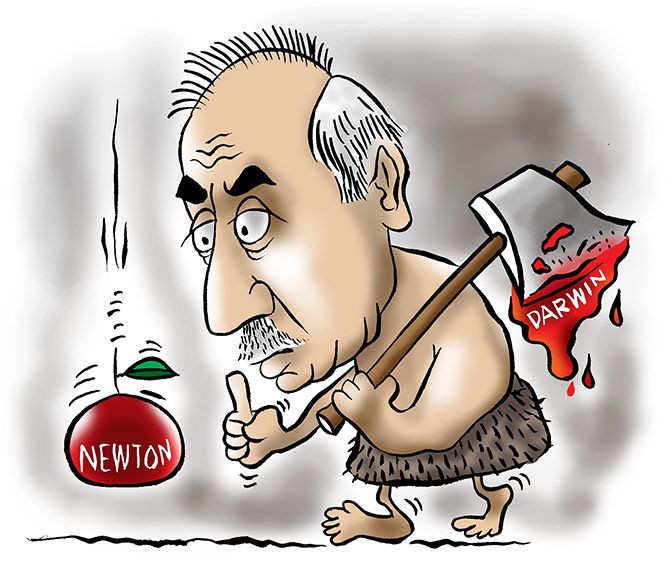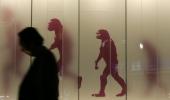'What would be questioned next?'
'Will the Copernicus theory of the sun being the centre of the universe, or Newton's theory of gravity?' asks Veena Mani.
Illustration: Uttam Ghosh/Rediff.com

Union Minister Satyapal Singh questioned the authenticity of Charles Darwin's theory of evolution.
His statement trashing the theory, which is believed to be one of the earliest by anthropologists in the West, has irked not just scientists but also the masses.
Some have gone to the extent of describing Mr Singh in derogatory terms on social media.
It is shocking to hear such a statement from a minister belonging to a party that claims to be the conservers of Indian culture and tradition.
The government at the Centre has been trying to find Indian parallels to popular Western scientific theories in various fields.
Apart from medicine, the theory of evolution is another area in which India has its own explanation.
Life on earth is a fascinating topic and has been debated ever since Darwin proposed that Homo Sapiens are the result of evolution over thousands of years.
Darwin's theory of evolution suggests that not all living beings co-existed on earth from the beginning.
With changing conditions, those who adapted to these changes survived.
Darwin also propounded that Homo Sapiens evolved through a series of processes, starting from life in water to the amphibian, and then to apes, half-man-half ape, and then Homo Sapiens.
Many thousand years before Darwin could propose such a theory, Hindu mythology came up with a similar theory of human evolution.
This is popularly known as the Dasavataram, which is essentially the 10 incarnations of Lord Vishnu, the protector.
According to this theory, life on earth began with the fish (matsya), moving to the amphibian in the form of the tortoise (kurma); then came the boar (varaha), which could walk on its feet but could survive in water.
In this manner, evolution continued till the modern man came into existence.
The order in which the incarnations are placed makes us believe that beings that proved to be the fittest and those who adapted to climate change survived.
Essentially, it is the evolution from marine to amphibian to land-based animals to pygmy to human.
The theory of evolution is not just about physical transformation from ape to man but it also includes mental transformation.
The fully developed man changed from being savage and wild with the axe (Parasurama) to the spiritual man in the form of the Buddha.
Experts on pre-history suggest the same by analysing stone tools used by species. The earliest tools were of the Oldowan variety used to cut carcasses.
Of course, the Dasavataram also emphasises the triumph of good over evil.
The concept is so widely accepted that we find numerous poetic compositions on it. Some of them are Telugu poet Bhadrachala Ramadas">Takkuvemi Manaku and its mention in Jayadeva's Gita Govindam.
In both these compositions among others, stories on each of the 10 incarnations are narrated.
Yes, the second part of Darwin\'s theory of evolution can be challenged and has already been done so by those studying the history of evolution.
Darwin held that traits could be preserved over generations. Those like Gregor Mendel questioned this theory and argued that a trait might disappear in one generation and reappear in another.
While Mendel and other scientists disapproved of Darwin's theory based on research and evidence, the minister's comment is not backed by evidence though he claims there seems to be some research in that direction.
The minister's statement is similar to that of the clergy in 19th century Europe, which refused to accept Darwinism. Except that, even the Catholic Church, later on, agreed that it is a proven fact.
One could even say his statement that there were no apes because nobody has seen them is silly. How would you see an ape when it perished long before the Common Era (CE)?
Primitive men lived many million years ago. Historians state that the earliest signs of humanity can be traced to the Pleistocene epoch.
As a saving grace, the minister, who holds a doctorate in chemistry, has said that an international conference could be held to decide what the truth is.
His statement makes us wonder what would be questioned next.
Will the Copernicus theory of the sun being the centre of the universe, or Newton's theory of gravity? Copernicus' theory was questioned by the Catholic Church in early modern Europe.












 © 2025
© 2025